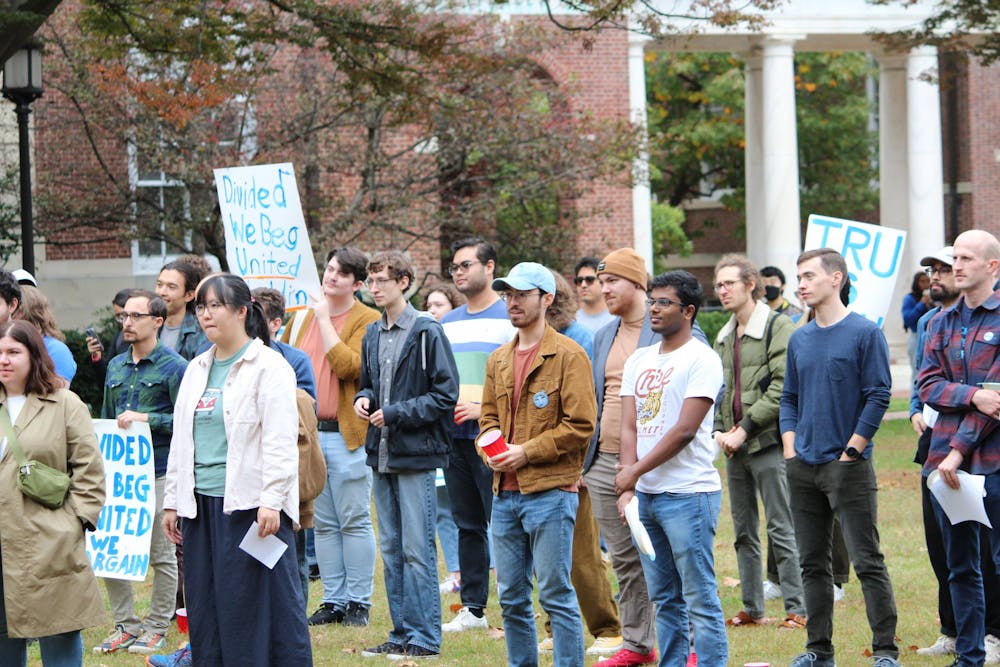Graduate students across three Hopkins campuses voted in a union representation election, facilitated by the National Labor Relations Board (NLRB), on Jan. 30 and 31. The election was organized by Teachers and Researchers United (TRU), which is affiliated with United Electrical Radio, and Machine Workers (UE). The vote overwhelmingly favored unionization — out of 3,335 NLRB-registered voters, 2,053 voted yes and 67 voted no, resulting in a 97% majority and 64% turnout rate.
According to TRU-UE, the majority of graduate students signed cards calling for an election, with over 2,000 cards submitted to the NLRB in total. The two-day election took place in Homewood, East Baltimore and Washington, D.C. campuses.
In an email to the community, Provost Sunil Kumar and Vice Provost for Graduate and Professional Education Nancy Kass wrote that they were looking forward to negotiating a bargaining agreement over the coming weeks.
“As the birthplace of doctoral education in America, we recognize this as an opportunity to ensure JHU continues to build on its legacy of not only providing world-class doctoral education and training but developing innovative new approaches to supporting our [doctoral] students in achieving personal and professional success,” they wrote.
TRU-UE’s platform includes a livable wage, guaranteed on-time payments, improved support and protection for international students, safe and reliable transportation and facilities, fair grievance procedures and a commitment to Baltimore.
In an email to The News-Letter, Kory Gaines, a second-year doctoral student in the Political Science department and an organizer for TRU-UE, highlighted the importance of a living wage for graduate student workers.
“All graduate students feel the overwork to some degree, and we ought to be compensated for being the workforce of the university,” they wrote.
Andrew Eneim, a TRU-UE Coordinating Committee member and doctoral candidate in the Biochemistry, Cellular and Molecular Biology Program, shared obstacles to forming a union that graduate students faced in an email to The News-Letter.
“By far one of the largest obstacles has been re-building the real, human connections that grad students have lacked since the start of the COVID-19 pandemic,“ he wrote. “We got used to not being comfortable talking to our coworkers and building community with each other.”
According to Eneim, rebuilding connections with coworkers has been a rewarding experience for graduate students. It has also allowed them to come together as a collective and call for action from the University.
TRU was formed in September 2014 following the implementation of the Strategic Plan. Since then, TRU has organized campaigns on issues including healthcare provision, retaining the Humanities Center and COVID-19 relief for University graduate student workers. TRU became affiliated with UE in October 2021.
Rothin Datta, a TRU-UE departmental organizer for Political Science and a doctoral candidate at the University, expressed his outlook on the graduate workers’ union in an email to The News-Letter.
“[Hopkins] graduate workers are looking for the opportunity to collectively bargain for fair compensation and better working conditions,” he wrote. “We are keen to be a part of the broader labor movement — a movement that is oriented towards creating more just workplaces and reclaiming worker power.”
Datta highlighted the impact of forming a union of graduate students.
“There has been a lot of institutional opposition to a variety of graduate student demands for several years,“ he wrote. “We’re excited to have a union that will better represent our needs.”
This comes as part of a broader trend among peer institutions. At Northwestern University and Yale University, graduate students have recently voted to form labor unions, while at the University of Chicago, union elections are underway.
Eneim shared his outlook on future negotiations with the University.
“We look forward to negotiating a contract that meets the needs of grad student workers. At the bargaining table we will be treated as equals and this will greatly improve the graduate worker experience at [the University],“ he said. “We know that to date we have not been made a priority and we plan to negotiate a contract that demonstrates graduate workers are a priority and deserve to be treated as such,” he wrote.
Shirlene John contributed reporting to this article.





